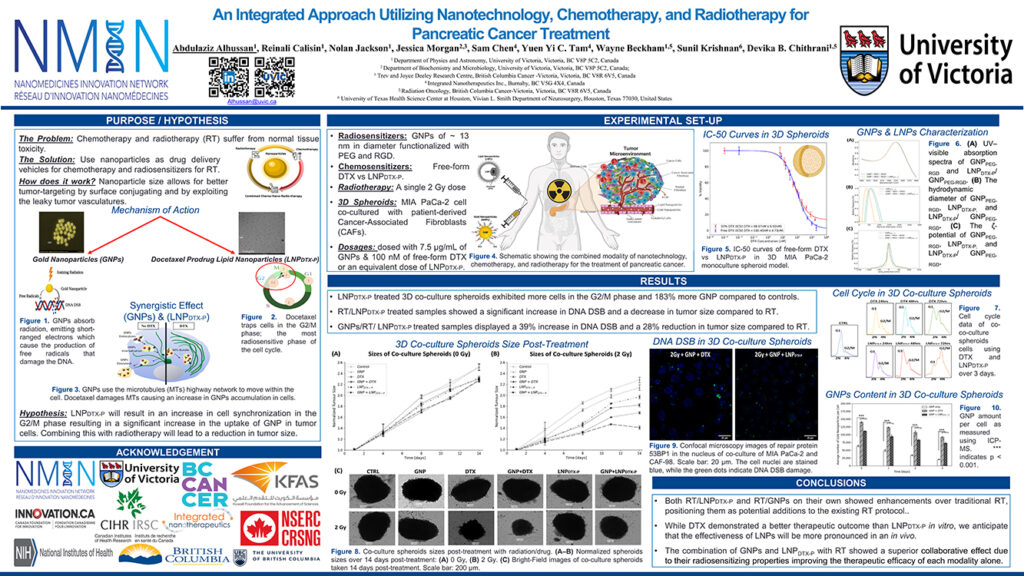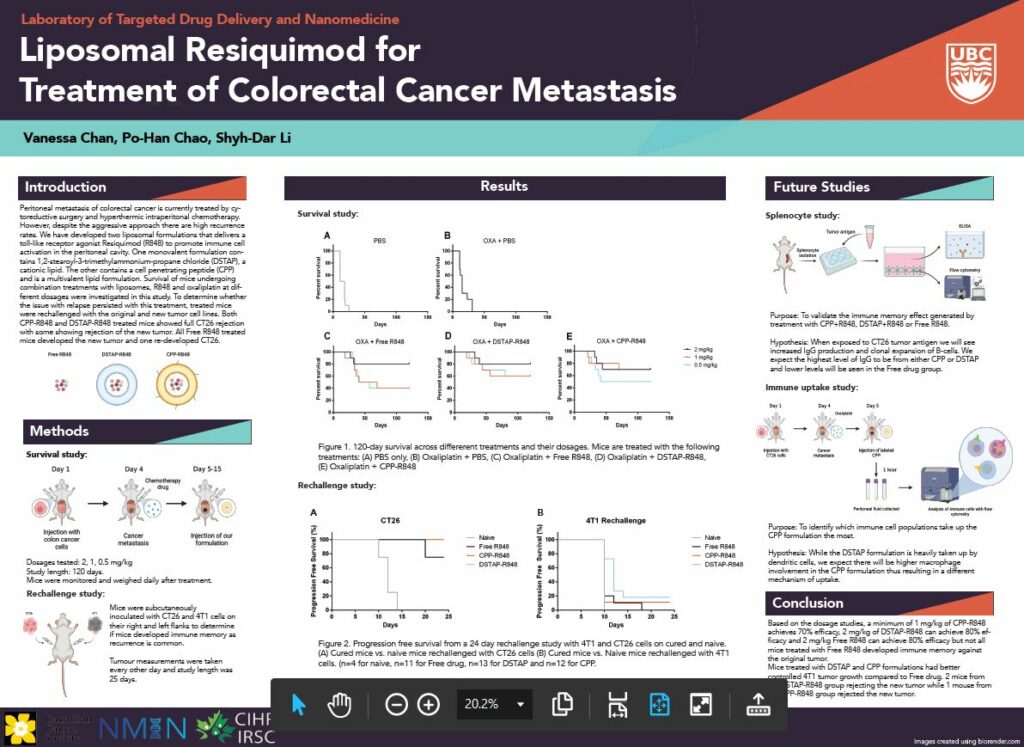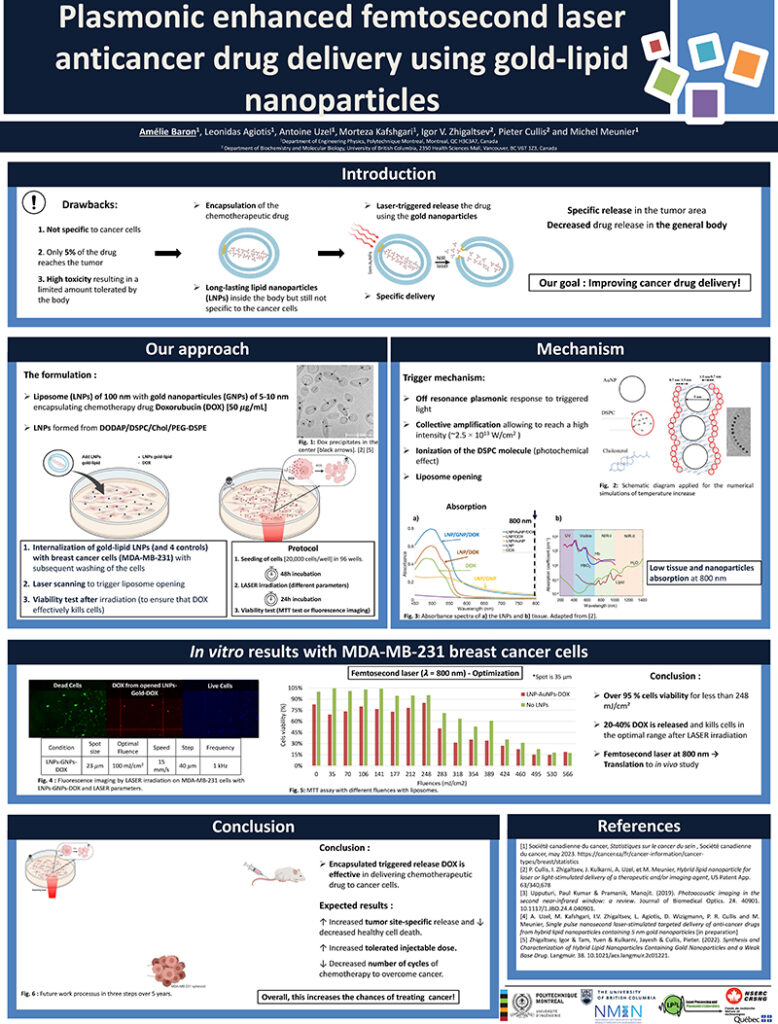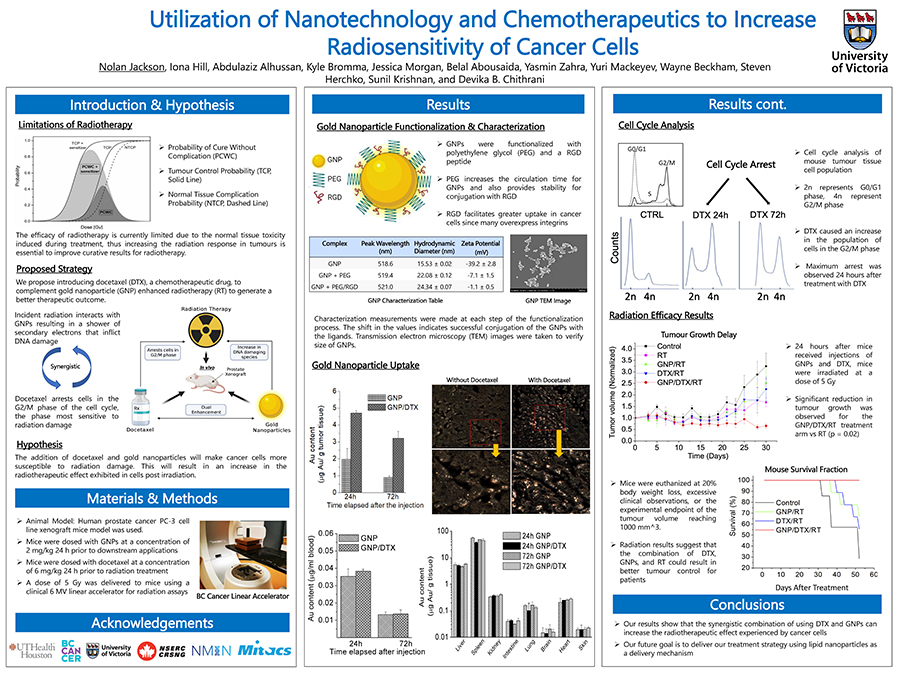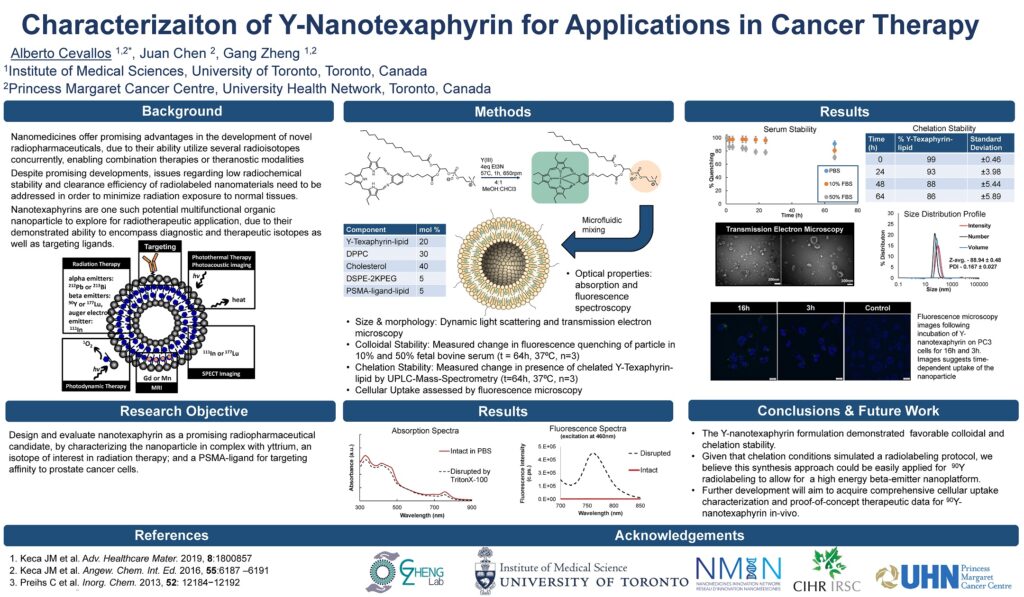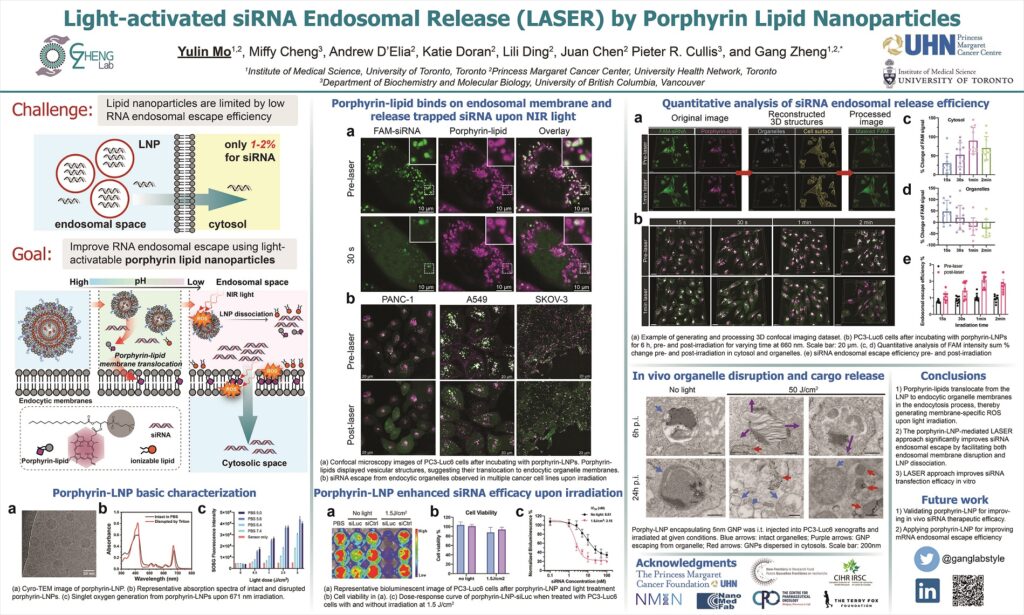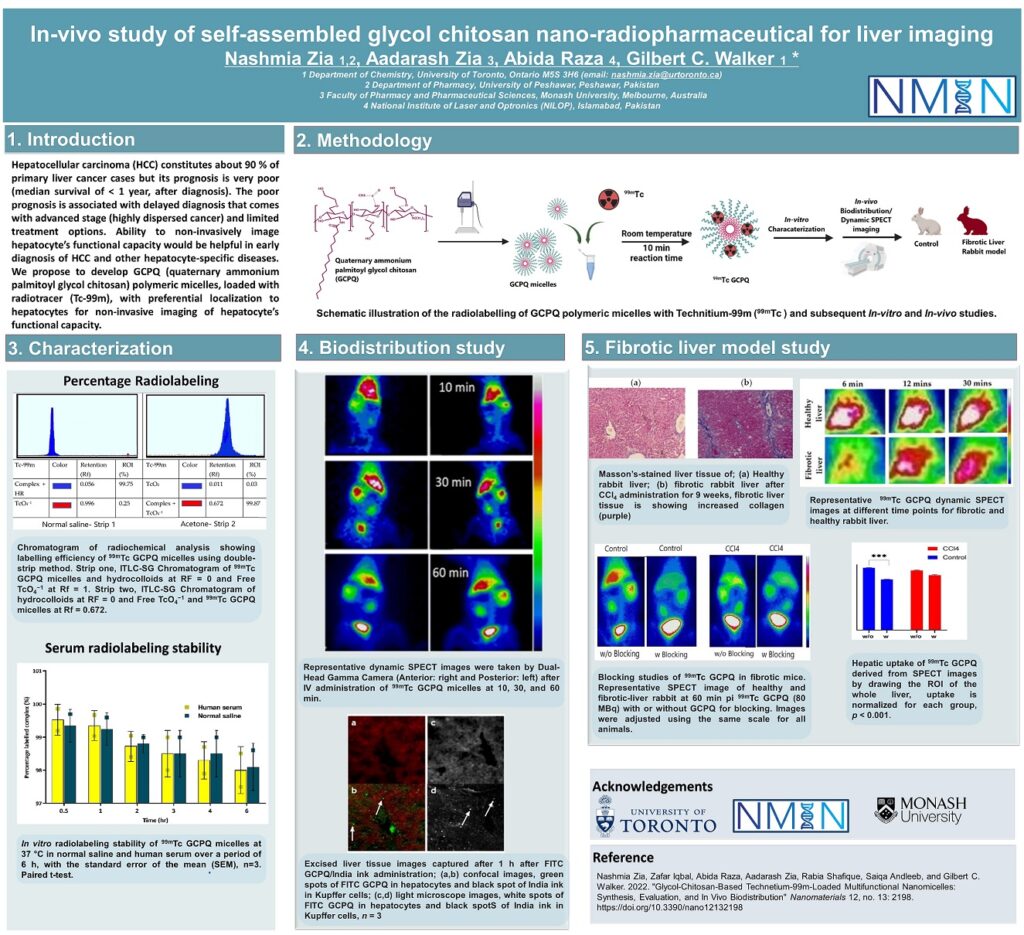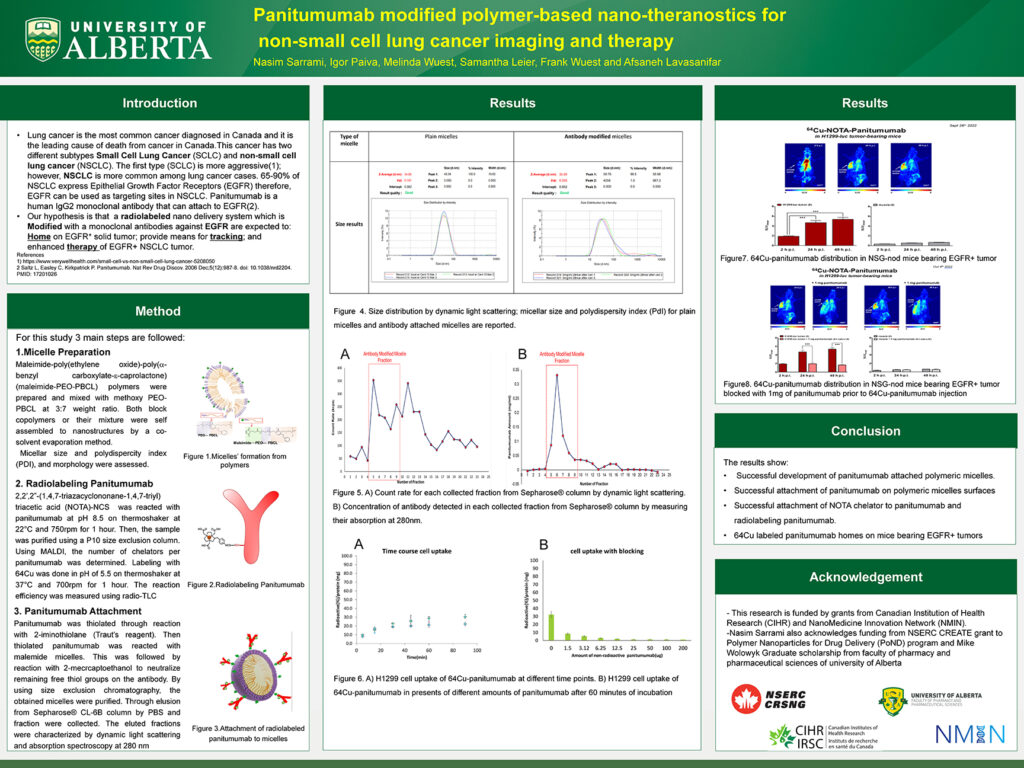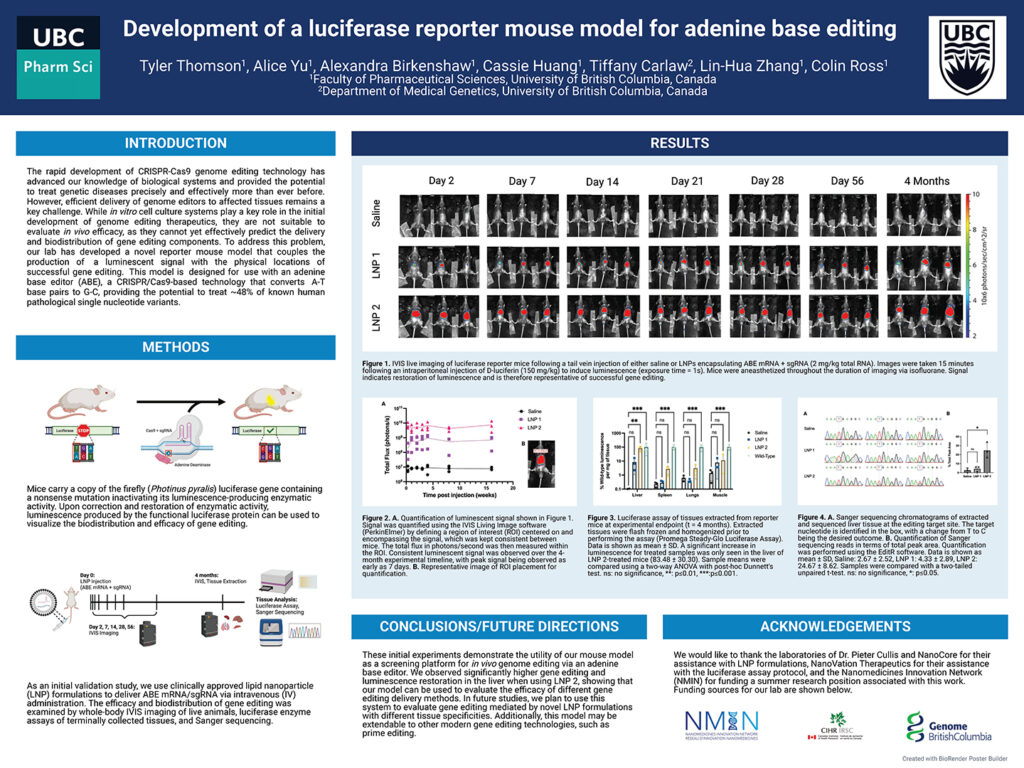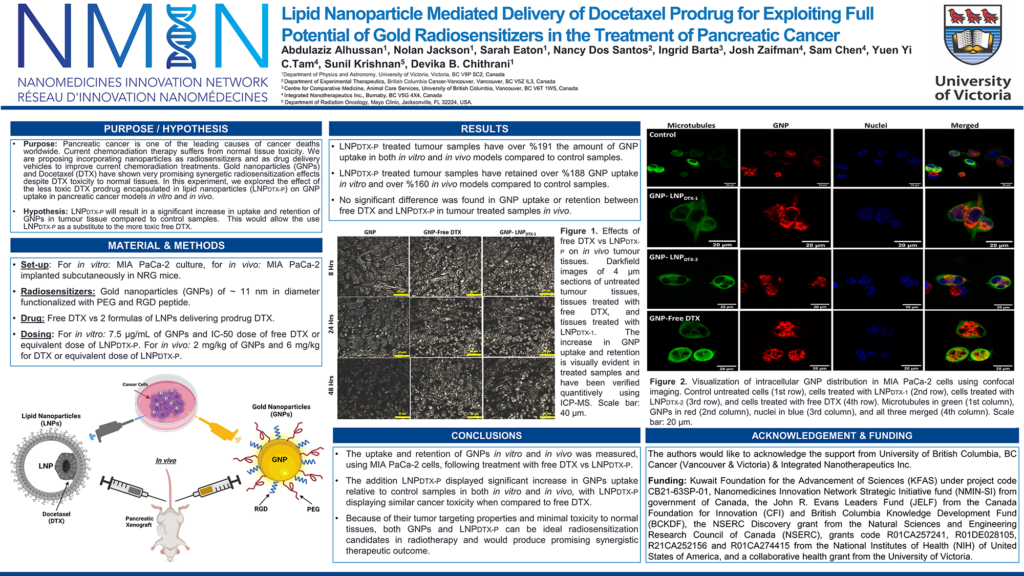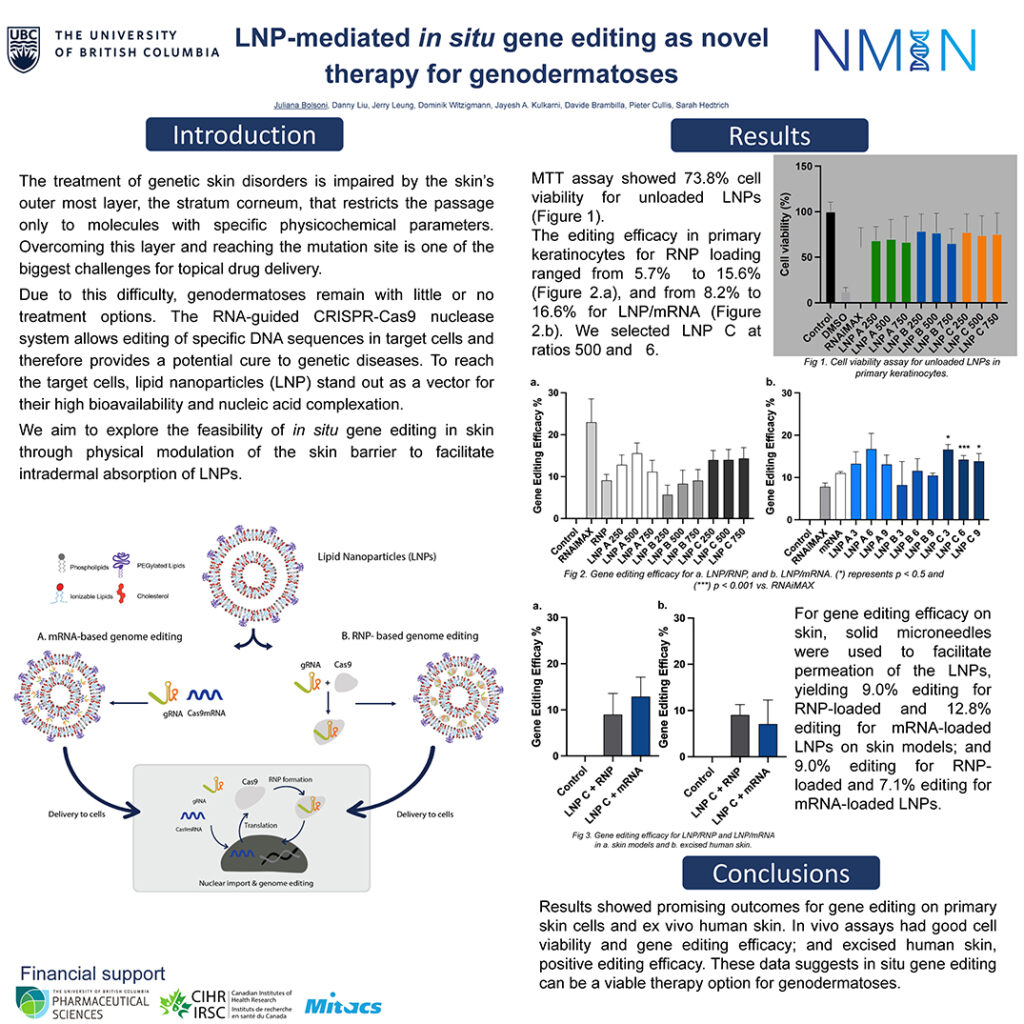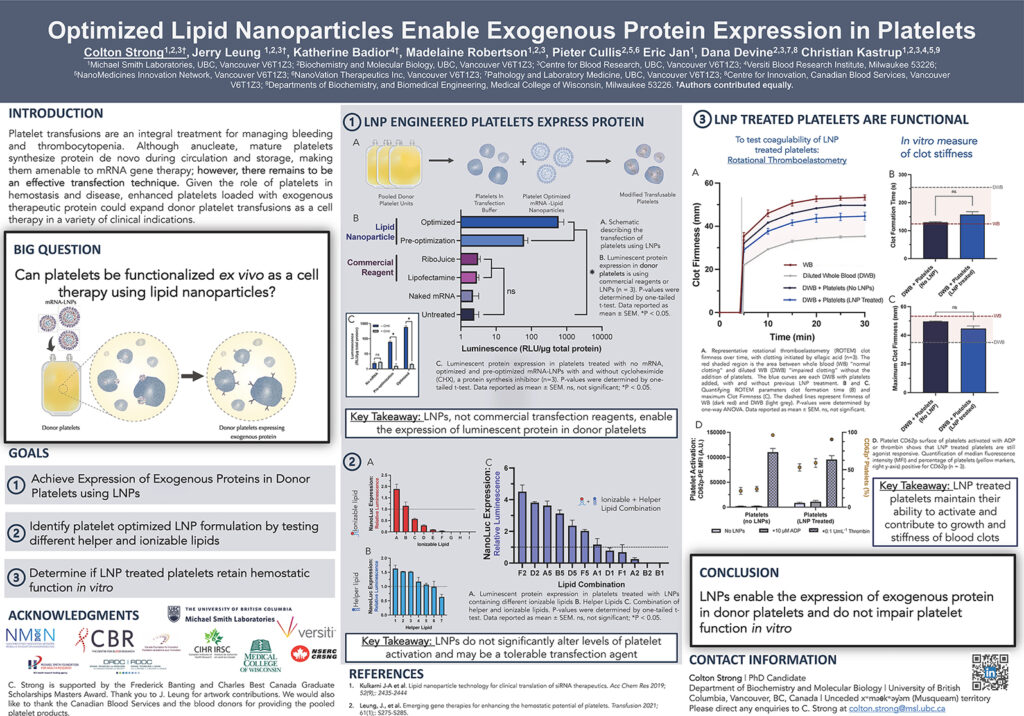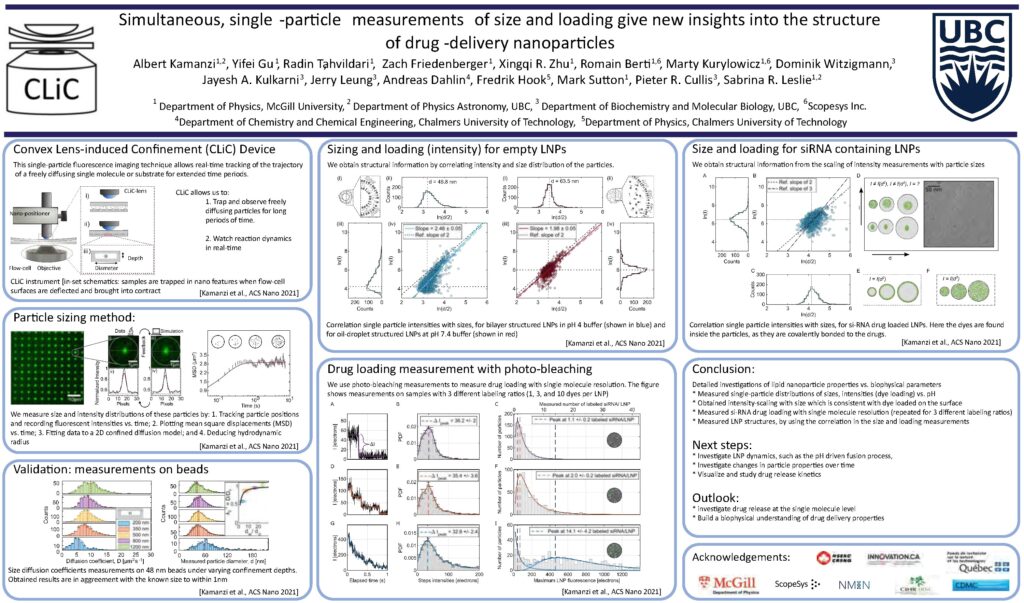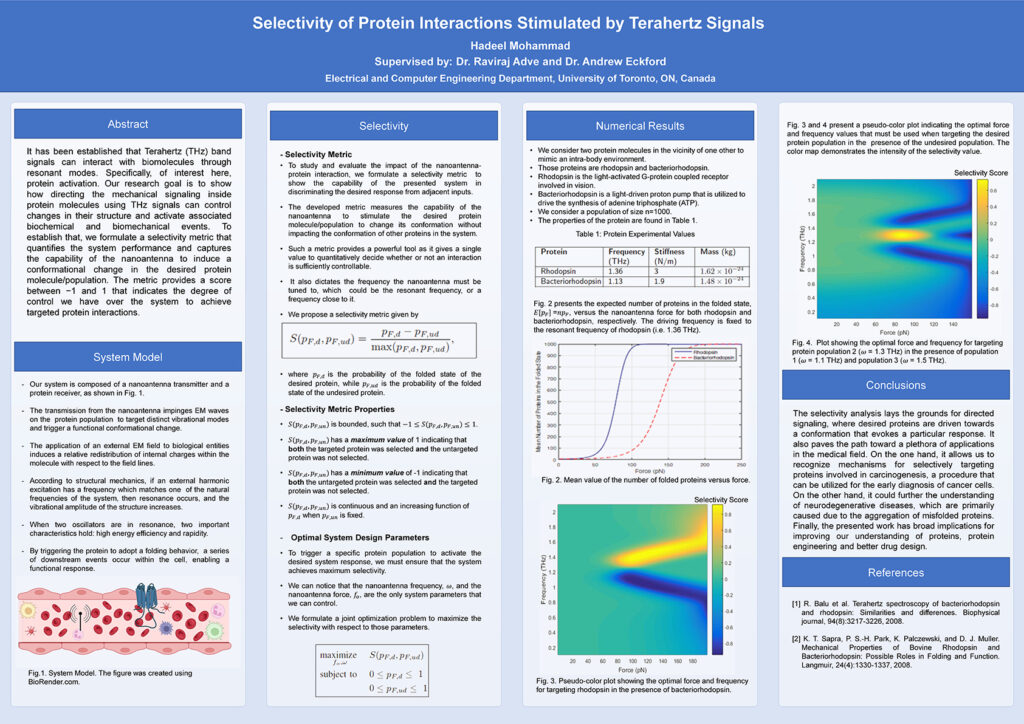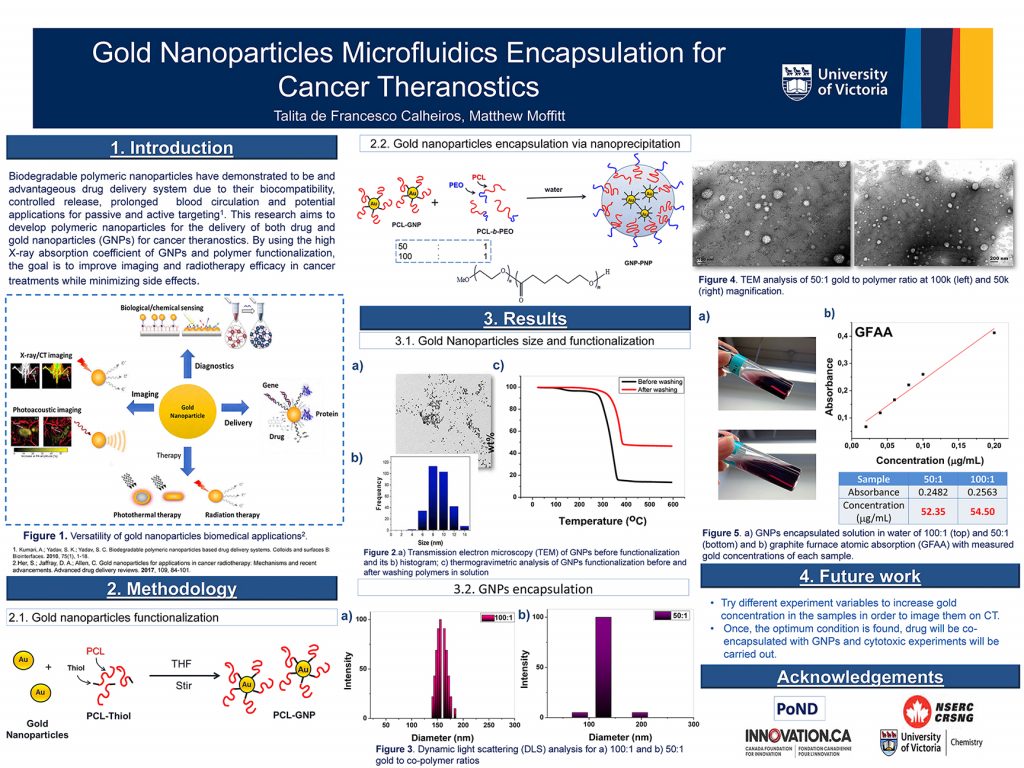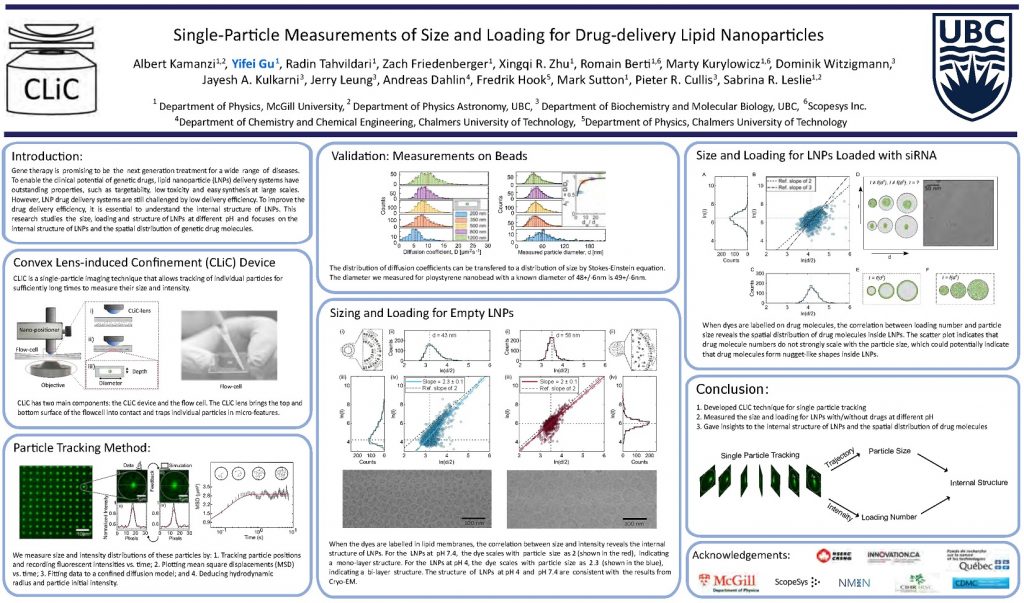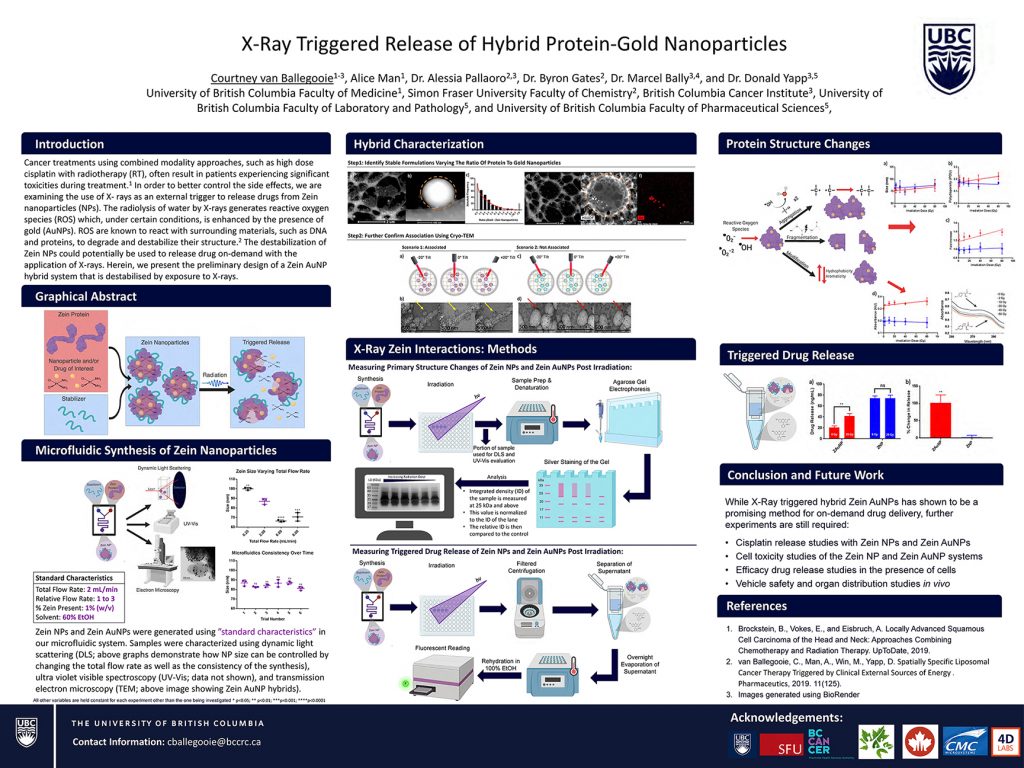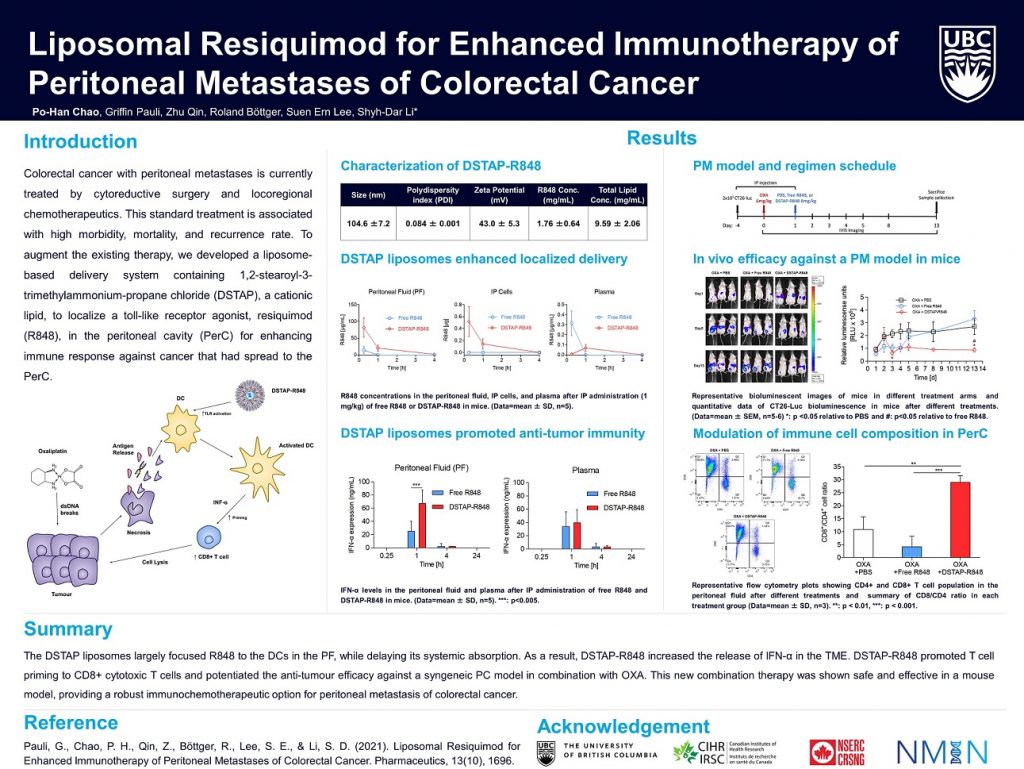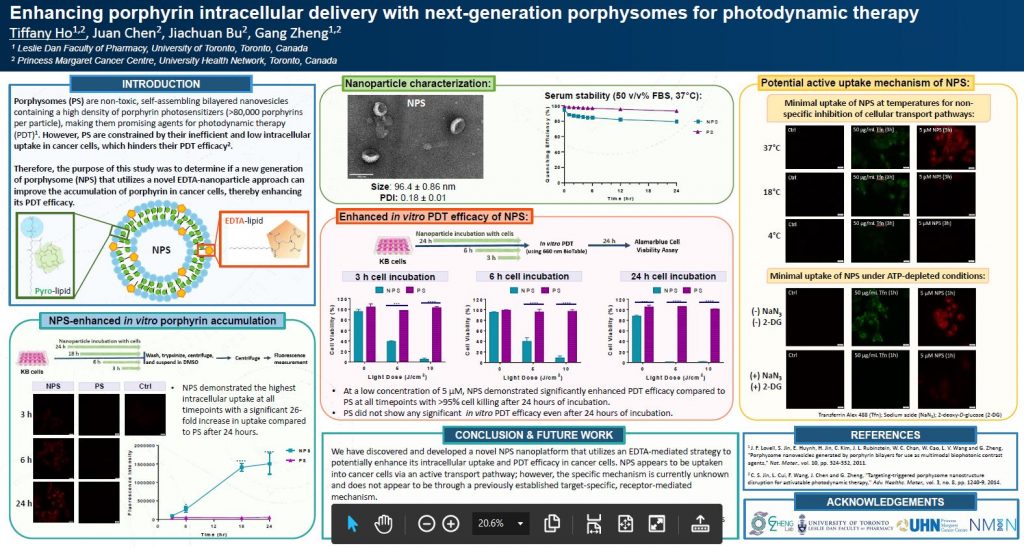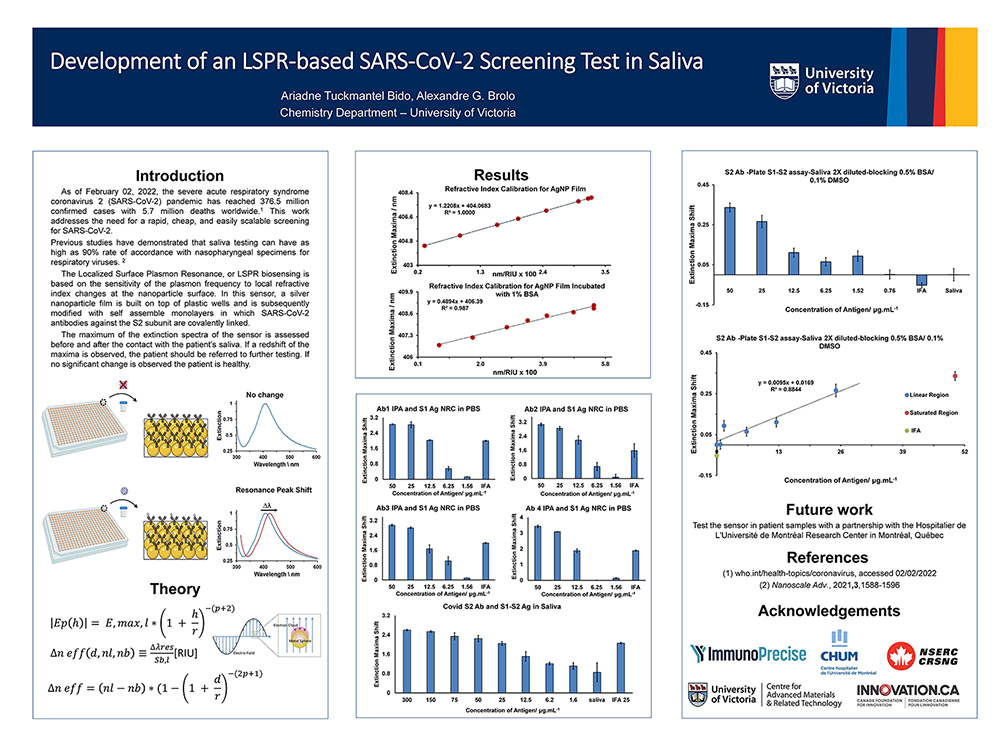NMIN
EVENTS
HQP Research Presentation Series
Ongoing
Up-coming
Date TBD
NMIN
HQP Research Presentation Series
The HQP Research Presentation Series gives NMIN HQP the opportunity to collaboratively develop their poster presentation skills, deliver a presentation in a supportive environment, and to receive constructive feedback.
More sessions are being planned…
NMIN
PAST SESSIONS
2022
24 February 2022
31 March 2022
26 May 2022
2021
25 March 2021
29 April 2021
27 May 2021
29 July 2021
30 September 2021
28 October 2021
Fifteenth Round
NMIN HQP Research Presentations
29 September 2023
10 – 11:00 am PDT | 1:00 – 2:00 pm EDT
PRESENTATIONS / POSTERS
PRESENTERS
An Integrated Approach Utilizing Nanotechnology, Chemotherapy, and Radiotherapy for Pancreatic Cancer Treatment
In this presentation, I will go over the incorporation of gold nanoparticles (GNPs) and Docetaxel prodrug lipid nanoparticles (LNPDTX-P) as potential radiosensitizers for the treatment in pancreatic cancer. GNPs and LNPDTX-P work synergistically with radiotherapy (RT) to improve cancer tissue toxicity with reduced normal tissue toxicity.
Abdulaziz Alhussan is a medical physics PhD candidate at the University of Victoria. His research focuses on incorporating Gold nanoparticles and Lipid Nanoparticles into the current radiation treatment protocol for hard-to-treat-cancers. He is eager to cooperate with other departments and institutes in multi-disciplinary research to accomplish the goal of defeating cancer.
Click on the poster for PDF.
Please contact the poster author with any questions or comments: alhussan@uvic.ca

Abdulaziz (Zé) Alhussan
University of Victoria
Liposomal Resiquimod for Treatment of Colorectal Cancer Metastasis
Despite having an aggressive treatment regime, peritoneal metastasis of colorectal cancer has a high recurrence rate. Two liposomal formulations delivering Resiquimod were developed and used in combination with oxaliplatin to treat mouse models of the disease. Mice treated with our formulations had a 70-80% chance of survival and fully rejected the original tumour upon re-challenge.
Vanessa Chan is an MSc student in Dr. Shyh-Dar Li’s lab at the University of British Columbia. She obtained her BSc in Biochemistry from the University of Victoria. Outside of school she enjoys skiing, cycling, and travelling.
Click on the poster for PDF.
Please contact the poster author with any questions or comments: vgchan@student.ubc.ca

Vanessa Chan
University of British Columbia
Fourteenth Round
NMIN HQP Research Presentations
29 June 2023
11:00 am – 12:00 pm PDT | 2:00 – 3:00 pm EDT
PRESENTATIONS / POSTERS
PRESENTERS
Plasmonic enhanced femtosecond laser anticancer drug delivery using gold-lipid nanoparticles
How can we improve chemotherapy treatment? This presentation will explore a new way of delivering chemotherapy agent specifically to the tumor using a pulsed laser and liposomes containing gold nanoparticles.
Amélie Baron is a PhD student in biomedical engineering in Dr Michel Meunier’s laboratory at Polytechnique Montréal. She is exploring the use of gold-lipid nanoparticles and laser interactions to find a new way to specifically deliver drugs to cells.
Click on the poster for PDF.
Please contact the poster author with any questions or comments: amelie.baron@polymtl.ca

Amélie Baron
Polytechnique Montréal
Utilization of nanotechnology and chemotherapeutics to increase radiosensitivity of cancer cells
In this presentation, I will discuss how introducing gold nanoparticles and chemotherapeutic agent docetaxel can increase the sensitivity of tumour cells to radiation. Together, the radiosensitizing agents form a synergistic relationship that enables the enhancement of radiotherapeutic damage that can be utilized to increase the efficacy of radiotherapy treatment.
Nolan Jackson is a medical physics MSc student at the University of Victoria. His research aims to exploit nanoparticle systems to target and increase the radiosensitivity of cancer cells by using a unique combination of physical and drug based radiosensitizers in hopes to preferentially increase the radiotherapeutic effect experienced by cancer cells.
Click on the poster for PDF.
Please contact the poster author with any questions or comments: nolanjackson12@uvic.ca

Nolan Jackson
University of Victoria
Thirteenth Round
NMIN HQP Research Presentations
30 March 2023
12:30 – 1:30 pm PDT | 3:30 – 4:30 pm EDT
PRESENTATIONS / POSTERS
PRESENTERS
A novel high concentration liposomal formulation of Topotecan for combination with checkpoint inhibitors
Chemotherapy is a widely used method of systemic cancer therapy. Although effective, its systemic permeation leads to unwanted side effects. Liposomal drugs such as Onivyde provide a way to passively target drugs to the tumor using the enhanced permeation and retention effect. Our goal is to a create a liposomal formulation of its poorly soluble analog, topotecan.
Sathak Garg Garg is a Masters student in Bally lab at the University of British Columbia. His research interest lie in liposomal formulation of chemotherapy and their potential for improving immunotherapy efficacy.
Click on the poster for a PDF version.
Please contact the poster author with any questions or comments: alberto.cevallos@mail.utoronto.ca

Sathak Garg
University of British Columbia
Light-Activated siRNA Endosomal Release (LASER) by Porphyrin Lipid Nanoparticles
This presentation will be talking about how to address the fundamental low RNA endosomal escape efficiency challenge in LNP-RNA field, using a porphyrin-lipid nanoparticle and light irradiation. I’ll explain the design, mechanism and effect on siRNA endosomal escape using this strategy.
Yulin Mo is a PhD candidate at the University of Toronto, under the supervision of Dr. Gang Zheng. His research focuses on the development of porphyrin-based lipid nanoparticles for RNA delivery and cancer treatments.
Click on the poster to enlarge.
Please contact the poster author with any questions or comments: yulin.mo@mail.utoronto.ca

Yulin Mo
University of Toronto
Moderator: Jennyfer Zapata-Farfan, Polytechnique Montréal
Jennyfer Zapata is a Ph.D. student enrolled in a double degree at Polytechnique Montreal Canada and the National Autonomous University of Mexico. Her research expertise includes electronic instrumentation, biophotonics, optics, and nanoplasmonics applied in ocular gene therapy.
Jennyfer Zapata-Farfan
Polytechnique Montréal
Early Detection is Key: Nanomicelles for Timely Diagnosis of Liver Fibrosis
This talk will present the findings of a study that evaluated the potential of 99mTc-Q9P35GC micelles as a radiotracer for the non-invasive assessment of liver function and diagnosis of liver fibrosis. The talk will highlight the biocompatibility, stability, and effectiveness of the micelles in identifying liver fibrosis in patients.
Nashmia Zia is a post-doctoral fellow at Dr. Walker’s lab at University of Toronto. Her current research focuses on the genomics of immune regulation and aging. She previously worked on the development of multifunctional nanoformulations for diagnosis and therapeutic purposes. With a background in pharmacy and pharmaceutical technology, she brings a unique interdisciplinary approach to her work on liver function and fibrosis assessments using nanomicelles.
Click on the poster for a PDF version.
Please contact the poster author with any questions or comments: nashmiazia@gmail.com

Nashmia Zia
University of Toronto
Twelfth Round
NMIN HQP Research Presentations
1 December 2022
12:30 – 1:30 pm PDT | 3:30 – 4:30 pm EDT
PRESENTATIONS / POSTERS
PRESENTERS
Characterization of Y-Nanotexaphyrin for Applications in Cancer Therapy
Several approaches have been implemented in the development of nanomedicines as promising radiopharmaceuticals. This talk will introduce and characterize a texaphyrin-nanoparticle as a suitable candidate for a radiotheranostic agent. This liposome-like nanoparticle has favourable characteristics that enable stable chelation of metals of interest in radiation therapy, such as Y, Lu, and Tb.
Alberto Cevallos is an MSc student in Medical Sciences at the University of Toronto. Currently working with Dr Gang Zheng’s group, his research focuses on the preparation of lipid nanoparticles for applications in the radiation treatment of cancers.
Click on the poster for a PDF version.
Please contact the poster author with any questions or comments: alberto.cevallos@mail.utoronto.ca

Alberto Cevallos
University of Toronto
Panitumumab modified polymer-based nano-theranostics for non-small cell lung cancer imaging and therapy
Nasim will be talking about her project on development of polymeric micelles whose surfaces are modified with a radio-labelled targeting agent. This targeting agent homes in on non-small-cell lung cancer tumors.
Nasim Sarrami is pursuing her PhD under the supervision of Dr. Afsaneh Lavasanifar at the University of Alberta. She’s a member of PoND, NMIN and the CSPS young scientist network planning committee. Her main interest is in developing nano-drug delivery systems, especially in the field of anti-cancer agents.
Click on the poster for a PDF version.
Please contact the poster author with any questions or comments: sarrami@ualberta.ca
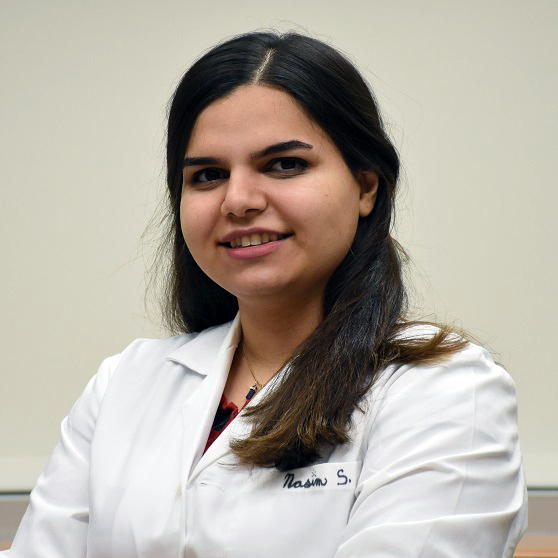
Nasim Sarrami
University of Alberta
Development of a luciferase reporter mouse model for adenine base editing
This talk will focus on the development of a luciferase reporter mouse model for adenine base editing, a gene editing tool with great potential for the treatment of genetic disease. The application of this model will be placed within the wider background of gene therapy and the current lack of reporter systems to evaluate genome editing efficiency in vivo. Finally, the future applications of this model for optimizing in vivo gene editing strategies will be discussed.
Tyler Thomson is a first year MSc student at the University of British Columbia working in the laboratory of Dr. Colin Ross. His research focuses on the application of CRISPR/Cas9-based gene editing systems for the treatment of genetic disease..
Click on the poster for a PDF version.
Please contact the poster author with any questions or comments: tyler.a.thomson@gmail.com

Tyler Thomson
University of British Columbia
Eleventh Round
NMIN HQP Research Presentations
29 September 2022
12:30 – 1:30 pm PDT | 3:30 – 4:30 pm EDT
PRESENTATIONS / POSTERS
PRESENTERS
Synergetic Combined Modality of Nanotechnology, Chemotherapy, and Radiotherapy for the Treatment of Pancreatic Cancer
Pancreatic cancer is one of the leading causes of cancer deaths worldwide. The use of nanoparticles as radiosensitizers and drug delivery vehicles could open the door to solving many of the obstacles in current cancer treatments. Gold nanoparticles (GNPs) and Docetaxel (DTX) have shown very promising synergetic radiosensitization effects despite DTX toxicity to normal tissues.
We explored the effect of DTX prodrug encapsulated in lipid nanoparticles (LNPDTX-P) on GNP uptake in pancreatic cancer models in vitro and in vivo. The results show that LNPDTX-P treated tumour samples have twice the amount of GNP uptake in both in vitro and in vivo models. This very promising result establishes that LNPDTX-P have very similar outcomes to the more toxic free DTX. These results demonstrate the potential of incorporating GNPs and LNPDTX-P as radiosensitization tools to current radiotherapy protocols for improved tumour targeting.
Abdulaziz (Zé) Alhussan is a medical physics PhD candidate at the University of Victoria. His research focuses on incorporating Gold nanoparticles and lipid nanoparticles into the current radiation treatment protocol for hard-to-treat-cancers. He is eager to cooperate with other departments and institutes in a multi-disciplinary research to accomplish the goal of defeating cancer.
Click on the poster for a PDF version.
Please contact the poster author with any questions or comments: alhussan@uvic.ca

Abdulaziz (Zé) Alhussan
University of Victoria
Repurposing Pyronaridine as a novel inhibitor of heterodimeric ERCC1-XPF DNA endonuclease for targeted sensitization of colorectal cancer to platinum-based chemotherapeutics
Chemo-sensitizing colorectal cancer to the effect of platinum-based chemotherapeutic. The chemosensitizer is pyronaridine which is initially used as an antimalaria drug.
Parnian Mehinrad is a Masters student in the faculty of pharmacy and pharmaceutical sciences, University of Alberta. Her area of research is drug delivery for cancer therapy.
Click on the poster for a PDF version.
Please contact the poster author with any questions or comments: jbolsoni@student.ubc.ca
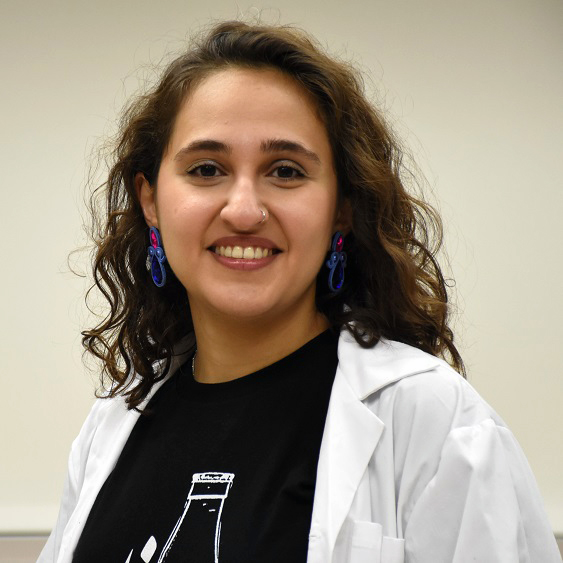
Parnian Mehinrad
University of Alberta
Optimized Lipid Nanoparticles Enable Exogenous Protein Production in Platelets
Platelet transfusions are the gold standard therapy for treating major bleeding, however, in some cases of severe hemorrhage, transfused platelets can have impaired function resulting in increased mortality. A major goal of our lab is to use lipid nanoparticles (LNPs) to deliver mRNA encoding pro-coagulant enzymes into platelets to enhance their function ex vivo, prior to transfusion. Here I present on our recent successes developing an optimized LNP to genetically engineer platelets to express reporter enzymes that preserves platelet hemostatic function.
Colton Strong is a third year PhD Candidate in the department of biochemistry and molecular biology at UBC co-supervised by Dr Christian Kastrup and Dr. Dana Devine. His research focuses on using lipid nanoparticle technology to functionalize donor platelets as a next-generation cell therapy for hemorrhage control. His long-term goals are to build on the platelet technology and other nanomedicines to treat blood diseases and coagulopathy.
Click on the poster for a PDF version.
Please contact the poster author with any questions or comments: colton.strong@msl.ubc.ca

Colton Strong
University of British Columbia
Moderator: Jennyfer Zapata-Farfan, Polytechnique Montréal
Jennyfer Zapata is a Ph.D. student enrolled in a double degree at Polytechnique Montreal Canada and the National Autonomous University of Mexico. Her research expertise includes electronic instrumentation, biophotonics, optics, and nanoplasmonics applied in ocular gene therapy.
Jennyfer Zapata-Farfan
Polytechnique Montréal
Tenth Round
NMIN HQP Research Presentations
25 August 2022
12:30 – 1:30 pm PDT | 3:30 – 4:30 pm EDT
PRESENTATIONS / POSTERS
PRESENTERS
Topical delivery of gene-editing tools into human skin
Delivery tools can be used to facilitate the intradermal absorption of LNPs to enhance the gene editing efficacy of CRISPR-Cas for the treatment of genodermatoses.
Juliana Bolsoni received a Bachelor’s in Biomedical Sciences from the University of Sao Paulo, Brazil, and is currently a Master of Sciences student at the Faculty of Pharmaceutical Sciences of the University of British Columbia.
Click on the poster for a PDF version.
Please contact the poster author with any questions or comments: jbolsoni@student.ubc.ca

Juliana Bolsoni
University of British Columbia
Single-particle microscopy of lipid nanoparticles and applications to vaccines and genetic medicines
This is a presentation on “Single-particle microscopy of lipid nanoparticles (LNPs)”, which is achieved by applying fluorescence microscopy in combination with custom imaging techniques developed by Prof. Sabrina Leslie’s group at UBC. More specifically, we use Convex Lens-induced Confinement (CLiC) microscopy to develop single particle assays for studying LNPs. We apply these methods to investigate the size and loading properties of lipid nanoparticle (LNP) containing silencing RNA (siRNA) as a function of lipid formulation, solution pH, and drug-loading. By taking a comprehensive look at the correlation between the intensity and size measurements, we gain insights into LNP structure and how the siRNA is distributed in the LNP..
Albert Kamanzi is currently a Postdoc research fellow at the Michael Smith Laboratories, UBC, in Prof. Sabrina Leslie’s group. His research focuses on developing single-molecule assays for studying lipid nanoparticles. He earned his B.Sc. in physics and M.Sc. in applied physics from the University of Massachusetts Boston, and his PhD in biophysics at McGill University.
Click on the poster for a PDF version.
Please contact the poster author with any questions or comments: albert.kamanzi@msl.ubc.ca

Albert Kamanzi
University of British Columbia
Selectivity of Protein Interactions Stimulated by Terahertz Signals
It has been established that Terahertz (THz) band signals can interact with biomolecules through resonant modes. Specifically, of interest here, protein activation. Our research goal is to show how directing the mechanical signaling inside protein molecules using THz signals can control changes in their structure and activate associated biochemical and biomechanical events. To establish that, we formulate a selectivity metric that quantifies the system performance and captures the capability of the nanoantenna to induce a conformational change in the desired protein molecule/population. The metric provides a score between −1 and 1 that indicates the degree of control we have over the system to achieve targeted protein interactions. The presented work sheds light on the potential associated with the electromagnetic-based control of protein networks, which could lead to a plethora of applications in the medical field ranging from bio-sensing to targeted therapy.
Hadeel Mohammad is a PhD candidate in the ECE Department at the University of Toronto. Her research interests lie at the intersection of wireless communication and nanotechnology. She received various awards for both her academic excellence and research potential including the 2019 and 2021 Ontario Graduate Scholarships, the Photonics Expansion Grant, and the Mitacs Gloablink Research Award.
Click on the poster for a PDF version.
Please contact the poster author with any questions or comments: hadeel.mohammad@mail.utoronto.ca

Hadeel Mohammad
University of Toronto
Moderator: Jennyfer Zapata-Farfan, Polytechnique Montréal
Jennyfer Zapata is a Ph.D. student enrolled in a double degree at Polytechnique Montreal Canada and the National Autonomous University of Mexico. Her research expertise includes electronic instrumentation, biophotonics, optics, and nanoplasmonics applied in ocular gene therapy.
Jennyfer Zapata-Farfan
Polytechnique Montréal
Ninth Round
NMIN HQP Research Presentations
26 May 2022
12:30 – 1:30 pm PDT | 3:30 – 4:30 pm EDT
PRESENTATIONS / POSTERS
PRESENTERS
The Development of an Impedance-Based Biosensor for Early Detection of Colon Cancer
Nanomaterials functionalized with biorecognition elements that interact with analytes play an important role in a biosensor design. The purpose of this study was to determine the effectiveness of two different kinds of nanoparticles in the signal improvement in an impedance-based biosensor. In the study, we were able to effectively conjugate 13 nm gold nanoparticles and 60 nm liposomes to small metabolites, including diacetylspermine, hippuric acid and creatinine, known colon cancer biomarkers. The sensing function of these conjugates was then validated by the specific attachment to an antibody-modified electrode surface for the development of an electrochemical biosensor for detecting biomarkers for colon cancer. The conjugates, as well as modified electrodes were characterized through various analytical, spectroscopic and microscopic techniques. Analysis of the impedance results suggest which kind of conjugates, gold nanoparticles or liposomes, act as a more effective signal amplifier in this biosensor. Optimizing the performance of individual components of a sensor would result in many useful advancements for the field of biosensor development.
Irene Chen is currently going into her fourth year of her Bachelor of Science in Biology and Psychology at the University of Alberta. She was an Undergraduate Research Assistant at the Wishart Lab at the University of Alberta from May 2021 to March 2022. During this time, she collaborated on a project that aims to develop an impedance-based biosensor for the early detection of colon cancer.
Click on the poster for a PDF version.
Please contact the poster author with any questions or comments: talita.francesco@gmail.com

Irene Chen
University of Alberta
Application of Early Health Technology Assessments to Nanomedicine: A Review of Conceptual Frameworks
Early Health Technology Assessments (eHTA) provide a systematic approach to guide early evidence generation and demonstrate value to stakeholders We aim to summarize existing literature on existing eHTA frameworks, and to explore the applicability of these frameworks to nanomedicine.
Elisabet Rodriguez Llorian is an economist with an interest in data driven research that can inform health policy and services. Currently she is a Postdoctoral Research Fellow at the Collaboration for Outcomes Research and Evaluation (CORE), at the University of British Columbia’s Faculty of Pharmaceutical Sciences.Click on the poster for a PDF version.
Please contact the poster author with any questions or comments: yifei.gu@msl.ubc.ca

Elisabet Rodriguez Llorian
University of British Columbia
Novel Sulfur-Containing Lipids for the Delivery of RNA Therapeutics
Lipid nanoparticle (LNP) formulations are the leading systems for in vivo delivery of siRNA and mRNA in clinical applications. Such LNPs incorporate structurally novel ionizable lipids terminating with a tertiary amino group. In this research, we explore aspects of the structure-activity relationship of MC3, a particularly efficacious ionizable lipid for siRNA delivery. Thus, MC3 analogues wherein the double bonds are replaced with sulfur atoms were found to retain in vivo activity. This may lead to new classes of lipids with improved biological profiles.
Fariba Saadati is a Research Associate supervised by NMIN researcher Dr. Marco A. Ciufolini. She has PhD in organic Chemistry. Her research focuses on the development of structurally novel lipids can be used to encapsulate and deliver therapeutic nucleic acids in lipid nanoparticle form. Selective delivery of nucleic acids to target tissues is an important consideration guiding lipid design.
Click on the poster for a PDF version.
Please contact the poster author with any questions or comments: cballegooie@bccrc.ca
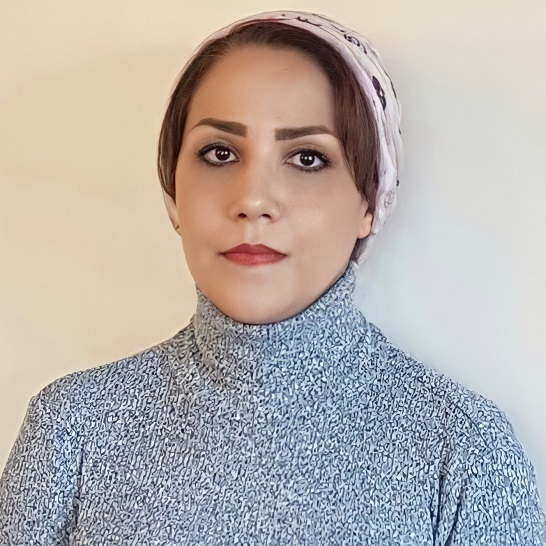
Fariba Saadati
University of British Columbia
PARP Inhibitor Drug Combinations and the Six Rights
Talk description coming soon.
Click on the poster for a PDF version.
Please contact the poster author with any questions or comments: cballegooie@bccrc.ca

Lucy Wang
University of Toronto
Eighth Round
NMIN HQP Research Presentations
31 March 2022
12:30 – 1:30 pm PDT | 3:30 – 4:30 pm EDT
PRESENTATIONS / POSTERS
PRESENTERS
Gold Nanoparticles Encapsulation into Polymeric Micelles for Cancer Theranostics
The presentation will discuss the development and characterization of hydrophobically modified gold nanoparticles by using poly(e-caprolactone), followed by their encapsulation into amphiphilic block copolymers, and their potential as a new theranostic platform.
Talita de Francesco obtained her MSc in chemistry at University of Sao Paulo, and is now a PhD candidate at University of Victoria. Her research goal is to develop a theranostic platform for cancer treatment by functionalizing and encapsulating gold nanoparticles into amphiphilic block copolymers.
Click on the poster for a PDF version.
Please contact the poster author with any questions or comments: talita.francesco@gmail.com

Talita de Francesco
University of Victoria
Single-Particle Measurements of Size and Loading for Drug-delivery Lipid Nanoparticles
To understand the drug-loading mechanism of lipid nanoparticles (LNPs) and optimize the design of LNPs, we developed a new imaging technique: Convex Lens-induced Confinement (CLiC) microscopy, which can be used to track mobilized nanoparticles with single molecule resolution over long viewing times. I will talk about how we learned the spatial distribution of silencing RNA (siRNA) drug molecules within Onpattro LNPs and offer valuable insights into the LNP structure.
Yifei Gu obtained her M.Sc. in biophysics with Dr. Sabrina Leslie at McGill University and now works as a research assistant in the Leslie Lab within the Michael Smith Laboratories at UBC. Her research focuses on developing tools and assays to study the drug-loading and -releasing mechanism of lipid nanoparticles (LNPs) and help improve the design of an LNP drug delivery platform.
Click on the poster for a PDF version.
Please contact the poster author with any questions or comments: yifei.gu@msl.ubc.ca

Yifei Gu
University of British Columbia
X-Ray Triggered Drug Release of Hybrid Protein-Gold Nanoparticle
This research focuses on the use of hybrid Zein-gold nanoparticles in X-Ray triggered drug release. A proof-of-principle release study and characterization of the hybrid system shows promising results for its potential in cancers which combine high doses of chemotherapy and radiation, such as head and neck cancer.
Courtney van Ballegooie is a fifth year PhD student in Interdisciplinary Oncology Program at the University of British Columbia. Her research mainly focuses on developing an X-ray triggered release system for cancer treatments using gold and protein nanoparticle hybrids.
Click on the poster for a PDF version.
Please contact the poster author with any questions or comments: cballegooie@bccrc.ca

Courtney van Ballegooie
University of British Columbia
Seventh Round
NMIN HQP Research Presentations
24 February 2022
12:30 – 1:30 pm PST | 3:30 – 4:30 pm EST
PRESENTATIONS / POSTERS
PRESENTERS
Liposomal Resiquimod for Enhanced Immunotherapy of Peritoneal Metastases of Colorectal Cancer
Colorectal cancer with peritoneal metastases is currently treated by cytoreductive surgery and locoregional chemotherapeutics. This standard treatment is associated with high morbidity, mortality, and recurrence rate. To improve the efficacy of immunotherapy in treating colorectal metastasis, we used a cationic liposomal formulation to enhance localized immunotherapeutics retention in peritoneal cavity, achieving improved therapeutic outcomes. Our liposome-based delivery system contains 1,2-stearoyl-3-trimethylammonium-propane chloride (DSTAP), a cationic lipid, to localize a toll-like receptor agonist, resiquimod (R848), in the peritoneal cavity (PerC) for enhancing the immune response against cancer that had spread to the PerC.
Po-Han Chao is a third year PhD student in Pharmaceutical Sciences at the University of British Columbia. His research mainly focuses on developing immunotherapies for cancer treatments using nanomedicine and drug delivery.
Click on the poster for a PDF version.
Please contact the poster author with any questions or comments: phc@student.ubc.ca
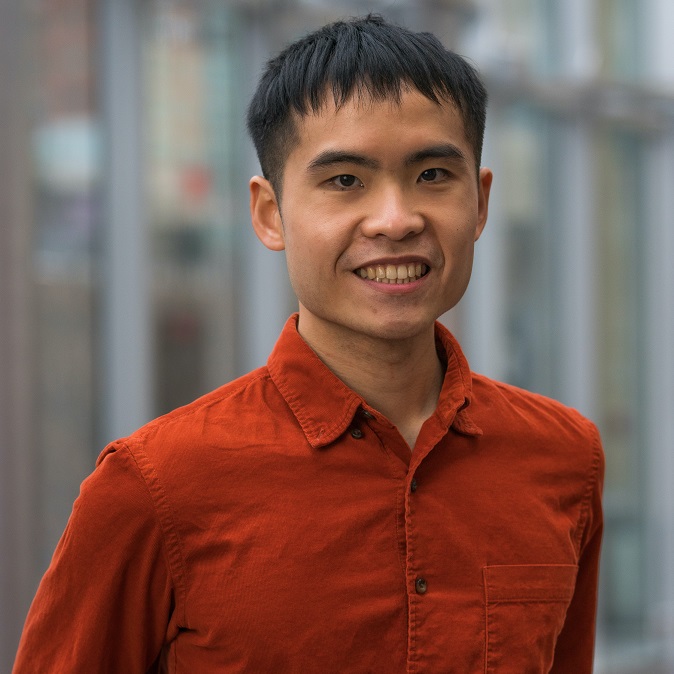
Po-Han Chao
University of British Columbia
Enhancing porphyrin intracellular delivery with next-generation porphysomes for photodynamic therapy
Porphysomes are liposome-like nanoparticles self-assembled and composed of a high density of porphyrin-lipid conjugates, allowing for their application in imaging and photonic-based therapies, such as photodynamic therapy (PDT). However, the utility of Porphysomes for PDT has been limited due to their poor cancer cell uptake. In this talk, I will present our discovery and development of a novel Porphysome nanoparticle to enhance their cellular uptake and PDT efficacy.
Tiffany Ho received her Bachelor of Medical Sciences degree from the University of Western Ontario and is currently pursuing her PhD in Pharmaceutical Sciences at the University of Toronto. Her research focuses on investigating the application of a new generation of porphysomes for photodynamic therapy and understanding the mechanism underlying their enhanced cellular uptake and efficacy.
Click on the poster for a PDF version.
Please contact the poster author with any questions or comments: tiff.ho@mail.utoronto.ca

Tiffany Ho
University of Toronto
Development of an LSPR-based SARS-CoV-2 Screening Test in Saliva
This talk will discuss the principles behind an LSPR-based test, the process of developing a SARS-CoV-2 screening test, and the hurdles and limitations of this research process.
Ariadne Tuckmantel Bido is a PhD candidate in Brolo’s lab at University of Victoria. She is working on immunosensors based on SERS and LSPR for antigen and viral detection.
Click on the poster for a PDF version.
Please contact the poster author with any questions or comments: atuckmantelbido@uvic.ca

Ariadne Tuckmantel Bido
University of Victoria
Moderator: Wesley Walker, University of Toronto
Wesley Walker received his BASc in Nanotechnology Engineering from the University of Waterloo, before moving to pursue an MSc in Medical Biophysics at the University of Toronto. Under the supervision of Dr. Gang Zheng, he is developing bacteriochlorin-based nanoemulsions for use in the treatment of cancer.
Wesley Walker
University of Toronto
